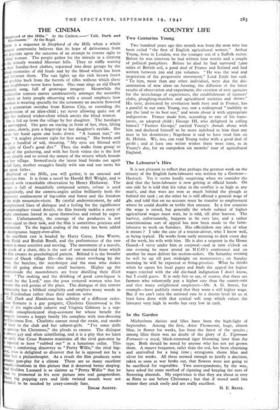THE CINEMA
Shepherd of the Hills." At the Carlton.—" Tall, Dark and Handsome." At the Regal. RE is a sequence in Shepherd of the Hills when a whole mired community believes that its hope of deliverance from ii depends upon the outcome of an attempt to restore sight to blind woman. The people gather for the miracle in a clearing
the densely wooded Missouri hills. They sit stiffly waiting their Sunday-best clothes, separated into dour groups by the bred memories of old feuds and by the blood which has been ed between them. The sun lights up the rich brown forest d sparkles back from the barrels of rifles without which these ry neighbours never leave home. One man sings an old Ozark ountain song, full of grotesque imagery. Meanwhile the chnicolor camera moves unobtrusively amongst the assembly thirty or forty people observing with a casual emphasis how woman is wearing specially for the ceremony an ancient flowered t, a generation overdue from Kansas City, or recording the
rehension of an idiot-child ; yet never allowing quite out of ght the isolated wicker-chair which awaits the blind woman. She is led up from the village by her daughter. The bandages e unwrapped. She goes on staring in front of her, then, lifting er arms, slowly, puts a finger-tip to her daughter's eyelids. She wers her hand again and looks down. " A human tear," she vs. " A mighty pleasant sight for first seeing." She bends and
sps a handful of soil, shouting, " My eyes are blessed with e sight of God's good dirt." Then she walks from group to oup of the gathering, and with her fresh vision she is the first see clearly and to reveal the nature of the misery which broods er her village. Immediately the latent feud breaks out again full fury, mother struggles fatally with son and son turns his n upon father.
Shepherd of the Hills, you will gather, is an unusual and
bitious film. It is from a novel by Harold Bell Wright, and is rected with remarkable observation by Henry Hathaway. The cture is full. of beautifully composed scenes, co:our is used ginatively, and the camera-angles utilise brilliantly both the ppressive confinement of log-cabin and forest and the freedom the wide mountain-vistas. By careful understatement, by odd mphasised lines of dialogue and a feeling for the significance commonplace visual details, the film bravely tackles a story of mple emotions forced in upon themselves and rotted by super- don. Unfortunately, the • courage of the producers is not ways equal to their task, and the film is sometimes precious and ntimental. To the logical ending of the story has been added incongruous happy-ever-after.
An excellent cast is headed by Harry Carey, John Wayne, etty Field and Beulah Bondi, and the performance of the two omen is most sensitive and moving. The movement of a muscle, e creak of a chair, this is the sort of raw material from which e film creates its psychological pattern. Behind it is the broader cture of Ozark village life—the tiny street overhung by the est, the butcher, the storekeeper and the man who makes airs all going about their small business. Higher up the ountainside the moonshiners are busy distilling their illicit Mt. " The making and the drinking of good corn-liquor is essed by the Lord," says the poor tortured woman who has come the evil genius of the place. The dialogue of this remote mmunity has a biblical simplicity and employs many words in eir Elizabethan rather than their modern sense.
Tall, Dark and Handsome has subtlety of a different order. sar Romero is a gay gangster, Charlotte Greenwood is the s of his night-club cabaret and Virginia Gilmore is a sup- edly unsophisticated shop-assistant for whose benefit the gster invents a happy family life complete with tree-dressing n Christmas Eve. Charlotte cannot stand the strain, and sneaks if back to the club and her cabaret-girls. " I've some dolls
unwrap for Christmas," she pleads in excuse. The dialogue always gay and often scintillating, and it is a pity that we learn early that Cesar Romero maintains all the rival gun-men he
reputed to have " rubbed out " in a luxurious cellar. This roves a comforting discovery to " Pretty Willie," the rival big- ot, who is delighted to discover that he is opposed not by a r but a philanthropist. As a result the film produces some Mine gun-play for a climax.. There are so many excellent edY-situations in this picture that it deserved better shaping. d Sheldon Leonard is so sinister as " Pretty Willie " that he ust be promoted in his next picture into real gangsterdom.
ose big popping eyes and little twisted mouth were not tended to be mocked by crazy-comedy fans.
EDGAR ANSTEY.


























 Previous page
Previous page